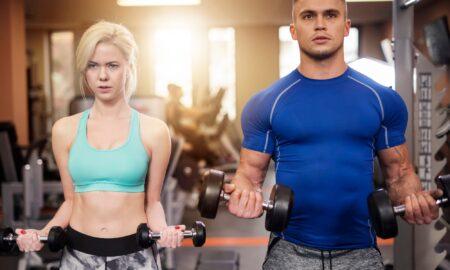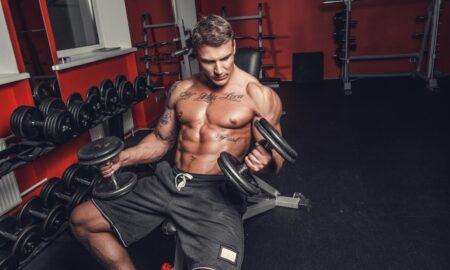Q: What’s your opinion of full-body routines done three days a week? Are they good for putting on mass and bodyweight, or are they better for strength? I’m an ectomorph who weighs 170 pounds.
A: I think full-body routines are ideal for a person who is just beginning a weight-training program. In order to train the whole body, you obviously need to limit the number of exercises you use. A person who is just beginning a weight-training program only needs to use one exercise per bodypart, so it isn’t difficult to train the entire body in one workout.
Full-body routines become almost impossible to perform when you’re more advanced. Using heavy weights and high intensity translates into greater recuperation time and abbreviated workouts. Once you begin using substantial poundages on exercises such as bench presses, squats, bent-over rows and so on, you quickly become overtrained when you go back to the gym and do it all over again in 48 hours. Now, imagine doing all that heavy work in one workout. Pretty tough assignment, huh?
Since you’re just beginning a weight-training program, you could use the full-body routine three days per week. After a few months of following that routine, your poundages will have increased and you’ll be ready to add some additional exercises for each bodypart. For example, instead of just performing bench presses for the chest, you could also add incline presses to your routine. At this point you’d be better served by splitting up your bodyparts over two days instead of training everything in one day. A good split for an intermediate bodybuilder is chest, back and delts on one day, followed by legs and arms on the next day.
When you move to the intermediate phase of training, you should train each bodypart twice instead of three times per week. The increased intensity brought on by heavier poundages and additional sets requires more recuperation. That’s the reason you won’t be able to train each bodypart three times per week and continue to grow.
The full-body routine performed three days per week is good for someone who just wants to stay in shape and keep the muscles toned. If you want to take it to the next level and make further increases in size and strength, however, you’ll need to increase the poundages that you’re using and cut back on the number of days you train each bodypart.
Q: I was wondering if you’ve ever used steroids. I often find myself reading articles about training tips from the pros. I can tell those guys are on steroids, and I have to wonder if they know anything about training, since they take drugs. If you’re not on steroids, what supplements do you use? A: One thing I pride myself on is that I’m always honest when I’m asked a question about bodybuilding. So, in answer to your question, yes, I did use steroids at one time in my training.
When I started training at the age of 14, my goal was to win the Mr. Universe title and then become a successful pro bodybuilder. I remember reading about anabolic steroids in the bodybuilding magazines when I was a mere 15 years old. From what I read, it seemed that steroids were necessary when a bodybuilder reached the top-level competitions; however, in those days bodybuilders would use steroids only during the last 12 weeks before a competition.
I understood that, eventually, I’d have to use steroids if I wanted to realize my dream and win the Mr. Universe title and become a professional bodybuilder; however, I also realized that I’d need to develop my body naturally by gaining all of my size and strength on my own. At a beginning bodyweight of only 135 pounds, I had a lot of work to do.
I began entering bodybuilding competitions when I was 16 years old, and I was shocked to realize that some of my peers were using steroids. I thought that only the guys in the Mr. America and beyond were using drugs. It didn’t take me long to realize that steriods were involved in all areas of the sport.
I still stayed with my original plan and didn’t use the drugs while I was competing in the teen contests. I wanted to gain all my size and strength naturally. I only weighed about 185 pounds as a teenager, but I quickly gained more size once I stopped competing so often. I took a break from competition after I turned 20, and I successfully bulked up to 230 pounds by the time I was 21.
When I started competing in senior-level events, such as the Mr. Illinois and Mr. Mid-America, I knew that almost everyone entering those competitions would be using steroids. In order to win, I believed, I had to use drugs. So in 1985 I used steroids for the first time. I took very moderate doses of Anavar, Deca-Durabolin and Primobolan Depot 12 weeks before the NPC Illinois Bodybuilding Championships. I weighed 201 pounds for that competition compared to the 230 pounds I weighed in the off-season without using steroids. I didn’t actually use the steroids to gain size, just to maintain my muscle tissue while I was dieting for my competition. I was able to do that because I’d gained all my size naturally.
Over the next four years I continued to use steroids once a year for the 12 weeks before a competition. Because I wanted to limit my use of the drugs, I limited the number of competitions I entered. I only competed once per year unless I could enter another contest that was just a week later. I didn’t want to start relying on the drugs by taking them more than 12 weeks a year.
Although I did very well competing on the local level’I won the Illinois State and Mid-America championships’I couldn’t crack the top 10 at the national level. I was competing at a bodyweight of 205 to 210 pounds, but most of the other Heavyweight competitors on the national level outweighed me by 20 to 30 pounds. It was at that point that I had to make a decision.
If I wanted to continue pursuing my dream of becoming a professional bodybuilder, I would have to increase the amount and duration of the drugs I was using. To me it was not worth the risk. Since only a small percentage of bodybuilders ever make it to the pro ranks, I didn’t want to put my health on the line for such a remote chance. Plus, if I ever did make it to the pros, I knew that the competition would be much greater and the pressure to get bigger (and use more drugs) would be even more pronounced.
I decided to stop competing’and to stop taking steroids. I was, for all intents and purposes, retired, until I heard about the natural bodybuilding competitions. Since I never relied on the drugs except for the last 12 weeks prior to a contest, I felt that I could make the transition to the natural competitions with no problem.
My first natural bodybuilding contest was the ’91 NPC Natural Illinois. I took second place, but I didn’t hit peak condition. I learned that losing bodyfat naturally requires a lot more time than it does when you’re using steroids. I didn’t diet long enough for that show, and I ended up doing too much cardio toward the end to make up for lost time. As a result, I was flat for the competition.
Over the years I’ve continued to train and compete naturally. I have increased my competition bodyweight by more than 10 pounds, and I look almost as good now as I did when I was using steroids. If I had to do it all over again, I would never have used the drugs in the first place. I had no idea when I was younger that there would ever be so many natural bodybuilding events or that the amount of drugs necessary to compete in the pros would be so extensive. Hindsight is 20/20, right?
I’m often asked if the size I currently have is due to the drugs I used earlier in my career. In my case, I really don’t think it had any effect. Because I was 230 pounds before ever touching the drugs and I only used the steroids to maintain my muscle tissue while I was dieting to lose bodyfat, I don’t think the drugs contributed to the size I have now.
As for the supplements that I currenly use, there are many. Of course, I use powders such as Pro-Fusion and Muscle Meals for my protein drinks. I also use the post-workout drink RecoverX, along with glutamine, NAC and creatine following each training session. I use glucosamine, chondroitin and Cort-Bloc prior to my workouts. In addition to those supplements, I also use a variety of vitamin and mineral supplements designed to protect against any nutritional deficiencies in my diet.
Bodybuilding supplements such as protein powder, creatine and glutamine are helping natural bodybuilders make remarkable gains that were not as possible 20 years ago. Advances in nutrition and training mean that it’s no longer necessary to use anabolic steroids to make incredible gains in bodybuilding. Stay natural, and all the gains you make will be your own.
Q: I’m dieting for a competition. Do you add any carbs while you’re trying to cut up? At six weeks out, what would you expect your body to look like? What changes to cardio and diet do you implement?
A: I don’t add carbs to my diet when I’m attempting to lose bodyfat. I always eat more carbs in the off-season than when I’m dieting. Carbohydrates are necessary fuel for workouts and also help with repair and recuperation of the muscle tissue; however, too many carbs will create fat storage, so I limit the amount of carbohydrates I eat when I’m getting ready to compete.
At six weeks out from a contest I expect to be no more than 10 pounds over the weight at which I’ll compete. I usually lose one to 1 1/2 pounds a week when I’m dieting for a contest. Any more than that and I risk losing muscle tissue. I’ve learned through experience that it’s always better to be ready a week before a competition in order to avoid having to take any drastic last-minute measures.
As for changes in diet and cardio, it all depends on how my physique looks. If I’m not losing bodyfat fast enough, I either decrease my calories or increase my activity level. Since too much cardio tends to eat up muscle tissue, I usually opt for lowering my calorie intake for a couple days before bringing it back to normal.
On the other hand, if I’m ahead of schedule and I am leaning out too quickly, I either decrease my cardio or increase my calories. If I decide to alter my diet, I will keep a close eye on my physique as I gradually increase the calories for a couple days. After a few days of increased calories, I go back down to my normal diet and watch for changes.
Editor’s note: John Hansen is the ’98 Natural Mr. Olympia and a two-time Natural Mr. Universe winner. Visit his Web site at www.naturalolympia.com. You can write to him at P.O. Box 3003, Darien, IL 60561, or call toll-free 1-800-900-UNIV (8648). IM




















You must be logged in to post a comment Login